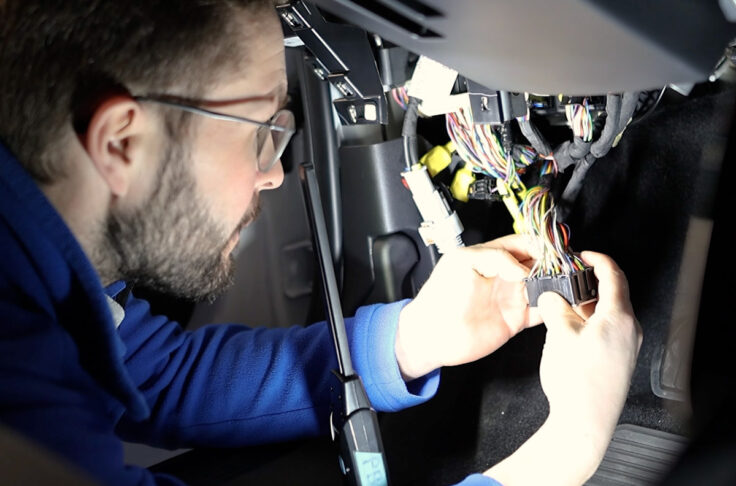
Damage detection: GreenMobility uses new Invers solution

Siegen, July 13th, 2023 – On average, carsharing operators have to spend around 10 percent of their revenue on vehicle damage. This includes repair costs that cannot be attributed to the person who caused the damage and his or her insurance, but also the cost of downtime when a vehicle has to be taken out of the fleet for a longer period of time due to delayed damage and incurs costs instead of generating revenue. “If a tire is severely damaged during a trip, the tire pressure often decreases insidiously and the tire is only flat after 24 or 36 hours,” explains Lasse Kempel, Head of Business Development at Danish car sharing provider GreenMobility. “Within that time, however, a car has often seen ten to fifteen other drivers. Previously, we couldn’t attribute the damage to the culprit and often didn’t have a chance to fix the problem before the car was no longer roadworthy at all.” So claims management is a significant cost driver for many operators.
GreenMobility offers car sharing with e-cars in Copenhagen and Aarhus as well as in Antwerp, Ghent, Brussels, Helsinki and Amsterdam. The aim is to provide a simple, flexible and sustainable mobility service for the urban target group. The more than 200,000 registered customers in these cities have more than 1,600 e-cars at their disposal, which they can use flexibly on a per-minute, per-day or subscription basis – and the trend is rising. Very soon, the GreenMobility team wants to be profitable, as one of the first providers of an all-electric car sharing fleet. They want to prove that the green transition can be economically successful with intelligent solutions for fleet operation.
What matters: reliable connectivity, sensitive sensor technology & intelligent analysis
However, as the number of users increases, so do the incidents of damage. At the same time, it is important that all vehicles in the fleet are easy to find, comfortable to use and perfectly roadworthy at all times. To ensure reliable access to the sharing vehicle, the GreenMobility team has been using CloudBoxx, the carsharing technology from the German shared mobility expert Invers from Siegen, for many years. The solution ensures that the vehicle is connected to the operator’s backend at all times, allowing authorized customers to accurately locate, open and close it in real time. “CloudBoxx is, from our point of view and experience, the most reliable solution for car sharing on the market,” says Lasse Kempel. “And with the new damage detection solution, the Invers team shows that they really understand and know how to technically solve the challenges of our business as operators.”
In early 2023, Invers added AI-based damage detection from carValoo to its shared mobility solution. Highly sensitive acceleration and gyro sensors collect data and information about current use in the car. How fast is the car moving? In what direction is it moving? How much is it accelerating right now? What does the braking process look like? The motion sensors in the car generate 72,000 data points per minute, which adds up to 103.7 billion data points per day per car. Not all of these are related to damage, which is relevant for damage detection. Closing the door of a parked car, for example, or driving through a pothole generates similar sensor data points as a parking bump. The solution’s intelligent algorithm filters and compresses much of this raw data already on the sensor box in the car, so less than ten percent of the data points still need to be transferred to the cloud. In the cloud, an AI algorithm further analyzes this data and detects patterns as well as anomalies. The AI then assigns these in real time to specific events that, such as a parking bump, have actually resulted in damage to a particular component. At the same time, it recognizes whether it is just a matter of a door closing or a pothole being driven over, which does not result in any damage and makes a report unnecessary.
In addition, the solution “learns” from Big Data and is constantly improving: Since its introduction three years ago, damage reports have been compared with actual damage, so that the artificial intelligence is continuously trained and its accuracy optimized. The system reliably detects even minor damage and locates it correctly on the vehicle. “It’s incredible the precision with which the solution identifies damage and describes the course of the damage,” says Lasse Kempel. “We’ve tested it in every conceivable usage scenario and found that it tells us exactly what’s happening to the car in detail.” The fully automated process is integrated with the operator’s backend via API and, depending on how thresholds are defined, provides the team with accurate data in real time, including damage not detected by traditional visual inspections.
“It wasn’t me” – on the psychology of knowledge
In the event of damage, GreenMobility can immediately send the service team to the car with an optimal briefing and ensure that it is ready for use again as soon as possible. In addition, depending on the damage, the team picks up the phone and contacts the customer in question to inquire about their well-being and discuss the next steps with them. In the past, the answer was often, “It wasn’t me,” and GreenMobility had to leave it at that. Today, the service employees are very knowledgeable and can describe the course of the damage in such detail that almost all customers are cooperative. “This also has an educational moment,” says Lasse Kempel. “Carsharing thrives on drivers treating the cars well, even if they don’t personally own them but share them with others.”
About Invers
Invers, inventor of automated vehicle sharing, enables mobility service providers to launch, operate and scale their offerings with integrated hardware and software solutions specifically designed for developers of shared mobility services. As the world’s first shared mobility technology company, Invers is developing and reliably maintaining the fundamental building blocks at scale to offer its customers cost-efficient and easily implementable tech solutions.
The company acts as an independent and reliable partner for operators of services such as car sharing, scooter sharing, ride pooling and car rental with the vision to make the use of shared vehicles more convenient and affordable than ownership. Customers include Share Now, Clevershuttle, Miles, imove, Carify, Getaround and Flinkster. The company was founded in 1993 and has locations in Siegen, Cologne and Vancouver. The development takes place entirely in Germany.


